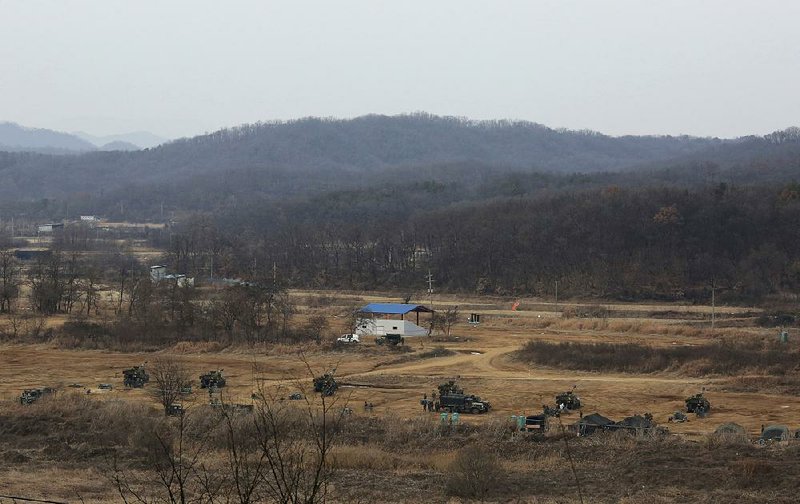President Donald Trump and South Korean President Moon Jae-in agreed Thursday to postpone the sprawling joint military exercise their nations hold each year until after the Winter Olympics.
Hours later, the Korea governments agreed to discuss finding ways to cooperate on the Winter Games. Reviving the nations' first formal dialogue in more than two years was another sign that animosities were easing after months of rising tensions over the North's nuclear and missile programs.
North Korea accepted the South's offer to meet at the border village of Panmunjom on Tuesday to discuss Olympic cooperation and how to improve overall ties, South Korea's Unification Ministry said today.
North Korea has expressed interest in sending a delegation to participate in the Olympics, which will be held in Pyeongchang, a mountainous area of South Korea that is just 60 miles south of the heavily fortified demilitarized zone. That's where North and South Korean troops have stood off against each other in an uneasy cease-fire since the 1953 armistice in the Korean War.
The U.S.-South Korea military exercise, Foal Eagle, often involves more than 30,000 American and 200,000 South Korean troops, as well as air, ground and naval operations.
Trump and Moon discussed their options Thursday in a phone call. The White House said in a statement that Moon and Trump agreed to "de-conflict" the Olympics and the military exercise so the United States and South Korea "can focus on ensuring the security of the Games."
"The two leaders agreed to continue the campaign of maximum pressure against North Korea and to not repeat mistakes of the past," the White House said. "The United States and the Republic of Korea are committed to a safe and successful 2018 Winter Olympic Games in Pyeongchang."
Army Col. Rob Manning, a Pentagon spokesman, said the decision was made "in the spirit of the Olympic Games." He did not disclose the specific start date of the exercise, saying only that it will be after the Olympics.
The White House statement and a message from South Korea's presidential Blue House both said that Trump promised to send a high-level delegation, including members of his family, to the Olympics, which begin Feb. 9.
Moon said in December that he had asked the U.S. military to postpone the joint military exercises until after the Olympics, adding that a delay was contingent on North Korea not conducting any more missile or nuclear tests.
But it was not clear from Thursday's statement whether North Korea had in fact made such a pledge. Earlier this week, the U.S. ambassador to the United Nations, Nikki Haley, said the United States was hearing reports that North Korea might be preparing for another missile test and warned that would lead to tougher steps against Pyongyang.
Moon favors dialogue to reduce tensions with Pyongyang and sees the Olympics as a "groundbreaking chance" to improve ties and achieve peace.
His government is also extremely keen to see the games go off successfully.
North Korea views the annual exercise as preparation for an invasion.
China has proposed that the United States and South Korea agree to freeze their annual military exercises in return for a North Korea pledge to freeze its nuclear and missile testing program. The Trump administration has rejected the idea.
U.S. Defense Secretary James Mattis insisted that the delay was a practical necessity to accommodate the Olympics, not a political gesture.
"For us, it's a practical matter," Mattis told journalists in an impromptu encounter at the Pentagon, citing the wide array of logistics and transportation support required to conduct the Olympics, some of which would otherwise be tied up with military exercises.
In addition to the Koreas' agreement to hold talks on the Olympics, North Korean leader Kim Jong Un recently reopened a key cross-border communication channel with South Korea that had been dormant since February 2016. The actions mark the first high-level diplomatic action in months.
Asked whether delaying the military maneuvers was a quid pro quo in response to Kim's reopening of cross-border communications, Mattis said, "No."
In a tweet early Thursday, Trump claimed his tough stance on nuclear weapons on the Korean Peninsula is helping push North Korea and South Korea to talk, although that assertion is in conflict with some of Trump's own statements. Last year, he ridiculed Secretary of State Rex Tillerson for talking about negotiations with the North.
Trump tweeted Thursday, "Does anybody really believe that talks and dialogue would be going on between North and South Korea right now if I wasn't firm, strong and willing to commit our total 'might' against the North."
Earlier this week, Trump seemed open to the possibility of an inter-Korean dialogue after Kim made a rare overture toward South Korea in a New Year's address. But Trump's ambassador to the United Nations insisted that talks won't be meaningful unless the North is getting rid of its nuclear weapons.
The overture about talks came after Trump and Kim traded more bellicose claims about their nuclear weapons.
In his New Year's address, Kim repeated nuclear threats against the U.S., saying he has a "nuclear button" on his office desk.
Trump mocked that assertion Tuesday evening, tweeting: "Will someone from his depleted and food starved regime please inform him that I too have a Nuclear Button, but it is a much bigger & more powerful one than his, and my Button works!"
Information for this article was contributed by Dan Lamothe and Simon Denyer of The Washington Post and by Robert Burns of The Associated Press.
A Section on 01/05/2018

